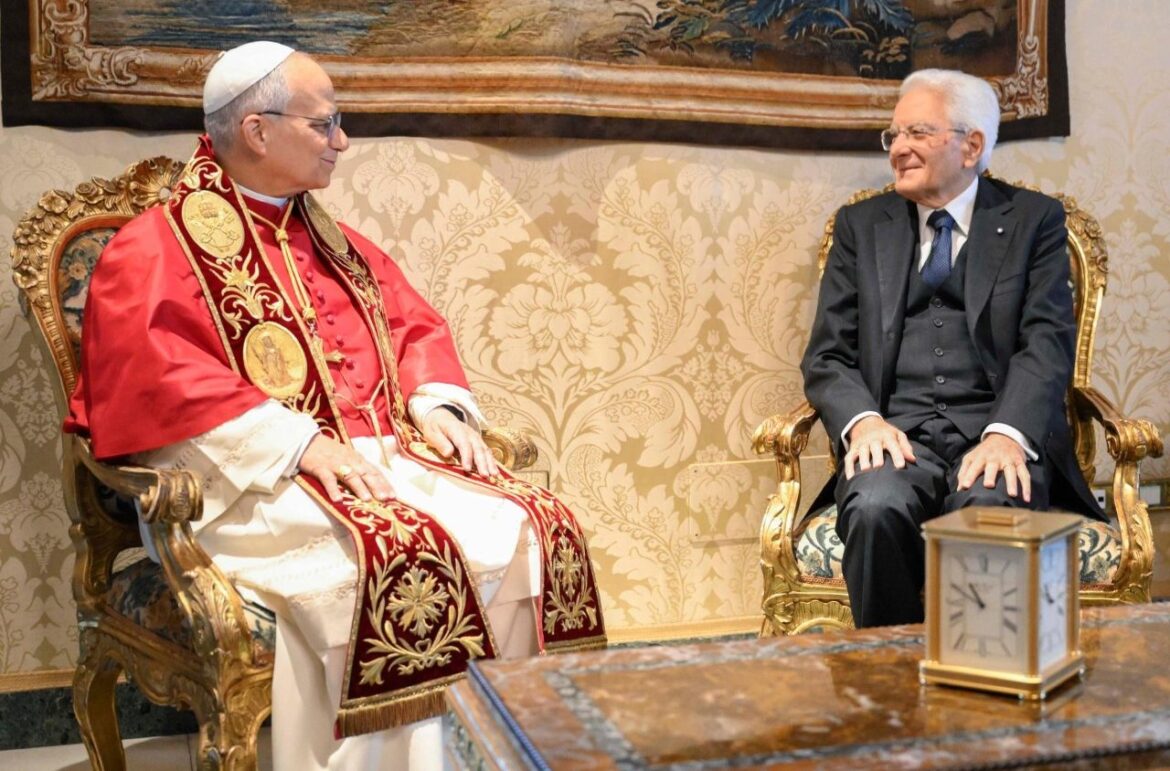Pope Leo XIV makes an official visit to the Quirinal Palace in Rome to meet with Italian President Sergio Mattarella, and praises the close collaboration of Italy and the Holy See to facilitate recent Church events that have enjoyed a global audience.
By Devin Watkins
Pope Leo XIV travelled across Rome to the Quirinal Palace on Tuesday, October 14, to pay a visit to Italian President Sergio Mattarella and hold talks on the “cordial bilateral relations” between the Holy See and Italy.
“As Bishop of Rome and Primate of Italy, it is meaningful for me to renew, through this visit, the strong bond that unites the See of Peter with the Italian people, whom you represent,” he said in his address near the end of the visit.
The Pope said the history of Italy and the Catholic Church have been entwined for many centuries, seen in the countless churches and bell towers to which Italian artistic and cultural creativity has given birth.
He called these physical creations an expression of “the innate creativity of this people, united with their genuine and steadfast faith, which has handed down to us a testimony of great beauty: artistic, certainly, but above all moral and human.”
Pope Leo thanked the Italian civil authorities for their efforts to welcome the millions of pilgrims who have come to celebrate the Jubilee of Hope, pay their respects to the late Pope Francis, and witness the conclave.
The logistics and security put in place during these events bore “a beautiful witness of hospitality and organizational efficiency” to Italy’s desire to welcome people from every part of the world.
Pope Leo XIV then recalled the upcoming centenary of the Lateran Pacts, which were signed in 1929 and carved Vatican City State out of what had been Italian territory since 1870.
The Church and Italian state work together closely to advance the common good, he said, noting their work in service of the human person, “whose inviolable dignity must always remain at the forefront of decision-making and action at all levels of social development, especially in defending the most fragile and needy.”
Pope Leo went on to recall the “grave suffering that wounds humanity worldwide and demands urgent yet farsighted responses.”
Peace, he said, is an essential element of the Church’s desire for the world, and he lamented the numerous wars that are devastating the planet.
The Pope recalled the words of several of his predecessors who appealed to global leaders as the world hovered on the brink of war, including Pope Benedict XV ahead of the First World War and Pope Pius XII ahead of the Second World War.
With Pope St. Paul VI, Pope Leo XIV said he renewed his “heartfelt appeal that we continue to work to re-establish peace in every part of the world, and that the principles of justice, equity, and cooperation among peoples—principles which form its irreplaceable foundation—be ever more cultivated and promoted.”
Pope Leo thanked the Italian government for its work to alleviate situations of hardship caused by war and poverty, especially noting its efforts to allow Gazan children to receive treatment at the Vatican’s Bambino Gesù Hospital.
He noted that 2026 will mark the 800th anniversary of the death of St. Francis of Assisi, saying the occasion marks an opportunity to highlight the importance of caring for our common home.
The Pope then pointed to the decline in birth rates in Europe in recent decades, and called for efforts to support the family and family values throughout society.
“Let us do everything possible to give confidence to families—especially young families—so that they may look to the future with serenity and grow in harmony,” he said.
Pope Leo also expressed gratitude for Italy’s assistance for migrants and efforts to combat human trafficking.
“These are among the great challenges of our time, and Italy has never turned away from them,” he said. “I encourage you to keep alive your attitude of openness and solidarity.”
In conclusion, Pope Leo XIV invited Italian society to appreciate the cultural depth that their forebearers handed down to them, avoiding the temptation to rob people of freedom under the auspices of fashion or marketing.
“Italy is a country of immense richness—often humble and hidden—and for that very reason, sometimes in need of being discovered and rediscovered,” he said. “I encourage all Italians to undertake this beautiful adventure, in order to draw from it hope, and to face with confidence the challenges of the present and the future.”




